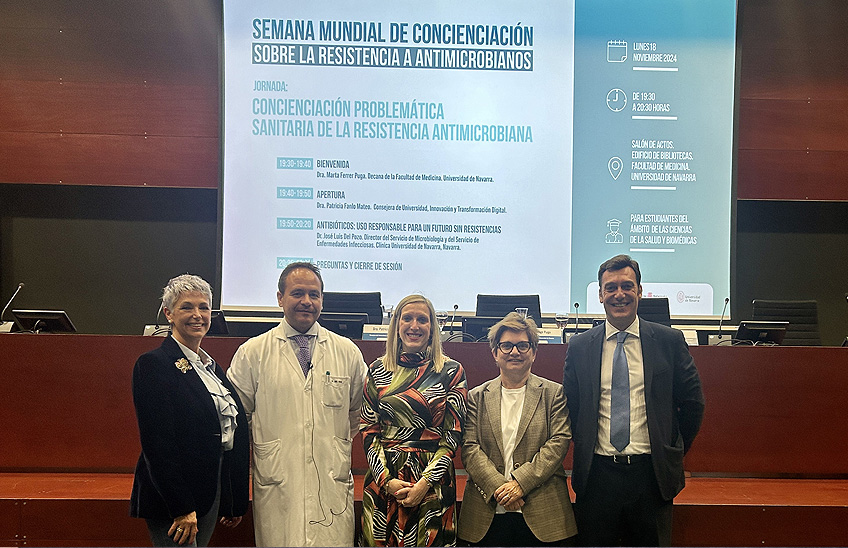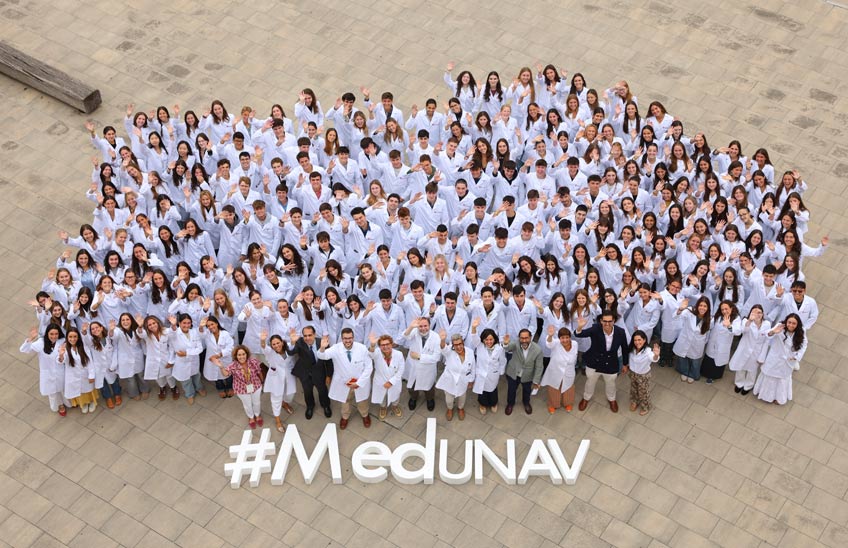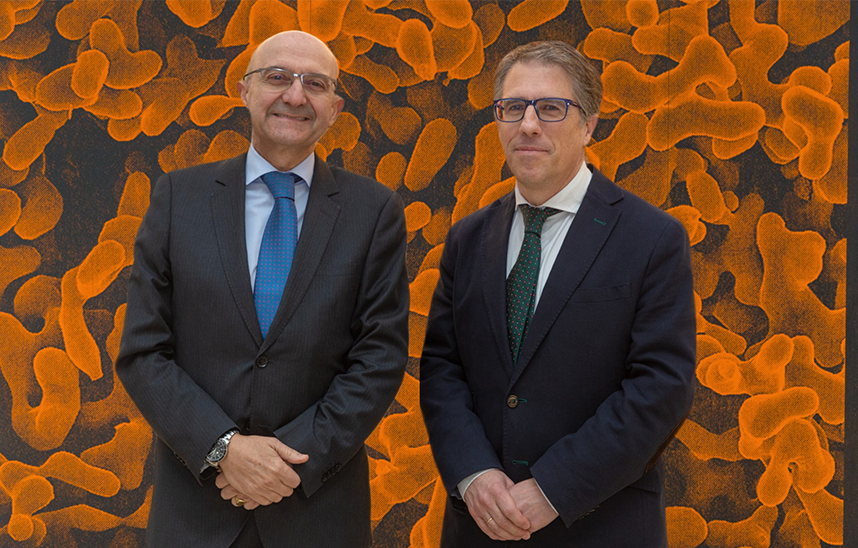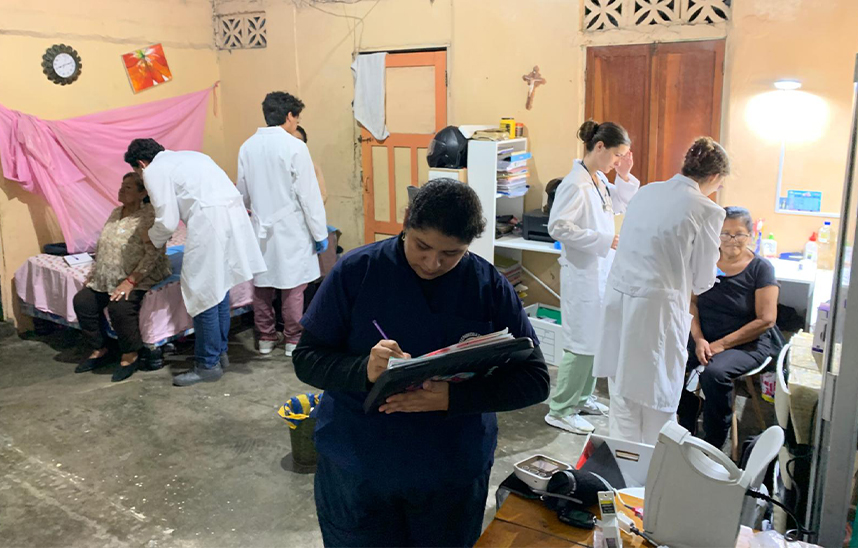University and Shionogi discuss present and future impact of antimicrobial resistance
Councilor Patricia Fanlo stresses the importance of research to prevent antibiotic resistance, a "global health threat" that claims more than 4.95 million deaths a year.

FotoCedida/Fromleft to right, Yolanda Rubio, key account manager at Shionogi España; José Luis del Pozo, director of the Microbiology Service and the Infectious Diseases Service of the Clínica Universidad de Navarra; Patricia Fanlo, Councilor of University, Innovation and Digital Transformation of the Government of Navarra; Marta Ferrer, Dean of the School of Medicine of the University of Navarra; and Pablo Abela, director of Marketing and Communication at Shionogi España.
19 | 11 | 2024
Antimicrobial resistance (AMR) is one of the greatest threats to public health globally, causing around 4.95 million deaths annually1. 1 In Europe, AMR is manager responsible for more than 35,000 deaths per year2, and in Spain there are approximately 4,000 deaths per year due to infections caused by resistant microorganisms.
With the goal to train and update health professionals and to raise public awareness of the importance of combating this growing problem, the University of Navarra, in partnership with the pharmaceutical company Shionogihas organized the workshop 'Raising awareness of the health problems of antimicrobial resistance'. The event aims to provide updated information and encourage the adoption of preventive measures to mitigate the effects of AMR.
The rational use of antibiotics is core topic to combat AMR, since its development is linked to the inappropriate use of these drugs. Many people use them for viral infections, such as colds, where they are not effective, or do not complete treatments, favoring the emergence of resistant strains. To preserve their efficacy, it is essential that professionals prescribe manager and that patients follow medical indications. In addition, raising awareness and Education among the population are crucial to prevent AMR and protect medical advances.
The meeting, held at the School of Medicine of the University of Navarra, was attended by Dr. Patricia Fanlo Mateo, Councilor for University, Innovation and Digital Transformation of the Government of Navarra, who in her opening speech highlighted the importance of the research in the rationalization of antibiotic use, "given that we are facing one of the greatest global health threats such as antibiotic resistance". She also emphasized Navarra's commitment to personalized Precision Medicine with the application of biological therapies.
For his part, Dr. José Luis del Pozo, director of the Microbiology Service and the Infectious Diseases Service of the Clínica Universidad de NavarraThe importance of adopting a comprehensive approach to combat AMR was emphasized by Dr. José Luis del Pozo, of the Microbiology Service and the Infectious Diseases Service of the University of Navarra. "At the professional level, we should prescribe antibiotics only when necessary and according to clinical guidelines, while patients should fill in treatments to avoid resistance. At the population level, it is essential to educate on the proper use of antibiotics, avoid self-medication, promote hygiene habits and encourage vaccination to reduce their use. Only with a joint effort between healthcare professionals, governments and society will we be able to guarantee the efficacy of antibiotics in the future," he explained.
Healthcare students and professionals play a key role in the prevention and control of AMR, a growing challenge affecting both common and complex infections and development of new drugs. It is crucial that they receive training in the prudent prescription of antibiotics, ensuring that their use is appropriate and necessary.
For Dr. Marta Ferrer, dean of the School of Medicine at the University of Navarra, "the update continuous knowledge of AMR should be an integral part of their training, allowing them to adapt to new advances and resistant strains. The partnership among healthcare professionals, together with increased awareness, is core topic to address antimicrobial resistance and ensure the efficacy of antibiotics in the future."
AMR is not only a human health problem, but is also closely related to animal and environmental health, highlighting the need to address AMR from a approach multidisciplinary and in an effective and sustainable manner. The approach "One Health" recognizes the interconnection between these three domains and emphasizes the importance of disease surveillance and control4. The Education and awareness raising are also crucial to encourage active participation of all sectors of society in the fight against this health problem.
goal 2030: Global and Local Strategies for Addressing AMR
Medicine and scientific advances risk being compromised if we fail to control antimicrobial resistance (AMR). The World Health Organization (WHO) has set ambitious goals for the coming years, including reducing infections caused by resistant bacteria and reducing the unnecessary use of antibiotics5. In addition, during the last UN General Assembly, world leaders pledged to reduce human deaths associated with AMR by 10% by 20306.
In this regard, if urgent measures are not taken, it is estimated that by 2050 antimicrobial resistance could overtake cancer as the leading cause of death, according to report "Tackling Drug-Resistant Infections Globally". In this context, Spain is among the European countries with the highest incidence of infections caused by resistant bacteria and one of the largest consumers of antibiotics in Europe7.
"At Shionogi, we recognize that the future of medicine depends on the ability of all stakeholders to manage this issue. For more than 60 years, we have pioneered innovation in anti-infectives and antimicrobial therapies, and we will continue to invest in new solutions to combat AMR. Our commitment to development is unwavering and we will continue to collaborate with academic community and healthcare professionals to ensure a healthy and sustainable future, protecting medical advances for future generations," said Pablo Abela, director Marketing and Communications for Shionogi in Spain.
workshop Raising awareness of the health issues of antimicrobial resistance'.
The meeting, held at the School of Medicine of the University of Navarra, was attended by Dr. Patricia Fanlo Mateo, Councilor for University, Innovation and Digital Transformation, who offered the opening speech of the workshop, and the interventions of Dr. Marta Ferrer, Dean of the School of Medicine of the University of Navarra; and Dr. José Luis del Pozo, director of the Microbiology Service and the Infectious Diseases Service of the Clínica Universidad de Navarra.
References:
(1) World Health Organization (WHO). World leaders commit to take decisive action against antimicrobial resistance. Last enquiry November/2024.
(2) European Commission. EU action on subject antimicrobial resistance. Last enquiry November/2024.
(3) Spanish Agency of Medicines and Health Products. Spain keeps its finger on the pulse against the silent pandemic: antibiotic resistance. Last enquiry November/2024.
(4) World Health Organization. One Health. Last enquiry November/2024.
(5) World Health Organization. Antimicrobial resistance. Last enquiry November/2024.
(6) National Antibiotic Resistance Plan. Last enquiry November/2024.
(7) O'Neill. Tackling drug-resistant infections globally. Last enquiry November/2024.



